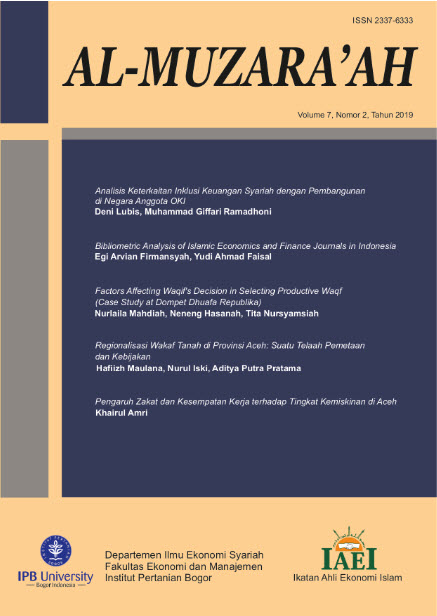Factors Affecting Waqif’s Decision in Selecting Productive Waqf (Case Study at Dompet Dhuafa Republika)
Main Article Content
Abstract
Indonesia as a country with largest Muslim population in the world has potentials in utilizing its Islamic philanthropy source of funds to alleviate social and economic problems in society, one is through waqf. Waqf that is managed productively has proven its positive contribution to the advancement of a country. However, the collecting of waqf fund is still dominated by direct waqf (non-productive) based on the instruction a waqif gave. This shows that the majority of waqif prefers direct waqf (non-productive) to productive one. Therefore, the purpose of this study is to analyze the factors that affect waqif’s decision in selecting productive waqf. Data collection is done by the questionnaires given to the respondents. The respondents are 65 waqif at Dompet Dhuafa Republika. The method used in this study is descriptive analysis and logit regression. The result shows that waqif’s decision in selecting productive waqf is affected by their comprehension on productive waqf, age, subjective norm, and marital status.
Downloads
Article Details

This work is licensed under a Creative Commons Attribution-ShareAlike 4.0 International License.
Author(s) who published in this journal agree to following terms:
- Authors understand and agree that copyright of manuscripts published are held by Al-Muzara'ah. The statement to release the copyright to Al-Muzara'ah is stated in form CTA (link doc).
- Copyright encompass exclusive rights to reproduce, to distribute, and to sell any part of the journal articles in all form and media.
This work is licensed under a Creative Commons Attribution-ShareAlike 4.0 International License (CC BY-SA) where Authors and Readers can copy and redistribute the material in any medium or format, as well as remix, transform, and build upon the material for any purpose, but they must give appropriate credit (cite to the article or content), provide a link to the license, and indicate if changes were made. If you remix, transform, or build upon the material, you must distribute your contributions under the same license as the original.
References
Al Arif, M. N. (2012). Wakaf uang dan pengaruhnya terhadap program pengentasan kemiskinan di Indonesia. INDO-ISLAMIKA, 2(1), 17-29.
[BPS] Badan Pusat Statistika. (2010). Kewarganegaraan, Suku Bangsa, Agama, dan Bahasa Sehari-Hari Penduduk Indonesia Hasil Sensus Penduduk 2010. [online] Retrieved from: https://sp2010.bps.go.id/files/ebook/kewarganegaraan%20penduduk%20indonesia/index.html.
Dompet Dhuafa Republika. (2018). Laporan Keuangan 2012-2017. [online] Retrieved from: https://www.dompetdhuafa.org/media file/media/laporan-keuangan.
Ekawaty, M. & Widiyanti, D. R. (2015). Pemahaman dosen dan karyawan Universitas Brawijaya terhadap wakaf uang berdasarkan faktor-faktor demografi. Seminar Nasional dan Call for Papers Ekonomi Syariah "Indonesia sebagai Kiblat Ekonomi Syariah" (pp. 240-241). Malang, Universitas Negeri Malang.
Fanani, M. (2011). Pengelolaan wakaf tunai. Jurnal Walisongo, 19(1), 179-195.
Halim, A., Isa, N. A., Irpan, H. M., Hasan, Arifin, & Rahim, A. (2015). Characteristic affecting charitable donations behavior: Empirical evidence from Malaysia. Procedia Economics and Finance at International Accounting and Business Conference (p. 570). Johor, Elsevier B.V.
Hasanah, U. (2008). Inovasi Pengembangan Wakaf di Berbagai Negara. Retrieved from: https://bwi.or.id/index.php/ar/publikasi/artikel/222-inovasi-pengembangan-wakaf-di-berbagai-negara.html.
Hosmer, D. W. & Lemeshow, S. (2000). Applied Logistic Regression (2nd ed.). New York (US), John Willey and Sons.
Kasri, R. A. (2013). Giving behaviours in Indonesia: Motives and marketing implications for Islamic charities. Journal of Islamic Marketing, 4(3), 306-324.
[Kemenag] Kementerian Agama Republik Indonesia. (2018). Penggunaan Tanah Wakaf. [online] Retrieved from: http://siwak.kemenag.go.id/
Likert, R. (1932). Technique for the Measurement of Attitudes. (R. S. Woodworth, Ed.) New York (US), New York University.
[MUIS] Majelis Ugama Islam Singapura. (2016). Annual Report 2016. [online] Retrieved from:
https://www.muis.gov.sg/-/media/Files/Corporate-Site/Annual-Reports/MUIS-AR16-Full-New.pdf
Mesch, D. J., Brown, M. S., Moore, Z. I., & Hayat, A. D. (2011). Gender differences in charitable giving. International Journal of Nonprofit and Voluntary Sector Marketing, 2. https://doi.org/10.1002/nvsm.432
Nisa, A. H. (2017). Faktor-faktor yang Memengaruhi Persepsi Masyarakat terhadap Wakaf Uang di Kota Bogor. (Undergraduate Theses, IPB University, Bogor, Indonesia). Retrieved from: http://repository.ipb.ac.id/handle/123456789/87945
Nizar, A. (2014). Faktor-faktor yang memengaruhi persepsi wakif tentang wakaf uang. Jurnal Bisnis dan Manajemen, 4(1), 1-16.
Nuraini, I., Takidah, E., & Fauzi, A. (2018). Faktor-faktor yang memengaruhi intensi dalam membayar wakaf uang pada pegawai kantor wilayah Kementerian Agama Provinsi DKI Jakarta. Jurnal Ekonomi Syariah dan Bisnis, 1(2), 97-108.
Pew Research Center. (2010). Religion and Public Life. [online] Retrieved from: http://www.pewforum.org/2010/11/04/Muslim-population-of-indonesia/
Pitchay, A. A., Meera, A. K., & Saleem, M. Y. (2015). Factor influencing the behavioral intentions of Muslim employees to contribute to cash-waqf through salary deductions. JKAU: Islamic Econ., 28(1), 57-90.
Qahaf, M. (2005). Manajemen Wakaf Produktif. Jakarta (ID), Khalifa.
Ramdhani, N. (2011). Penyusunan alat pengukur berbasis Theory O\of Planned Behavior. Buletin Psikologi, 19(2), 57.
Rozalinda. (2015). Manajemen Wakaf Produktif. Jakarta (ID), PT RajaGrafindo Persada.
Said, I. A. (2013). The Power of Wakaf. Tangerang (ID), Dompet Dhuafa.
Stern, K. (2013). Why The Rice Don't Give to Charity. [online] Retrieved from: https://www.theatlantic.com/magazine/archive/2013/04/why-the-rich-dont-give/309254/

